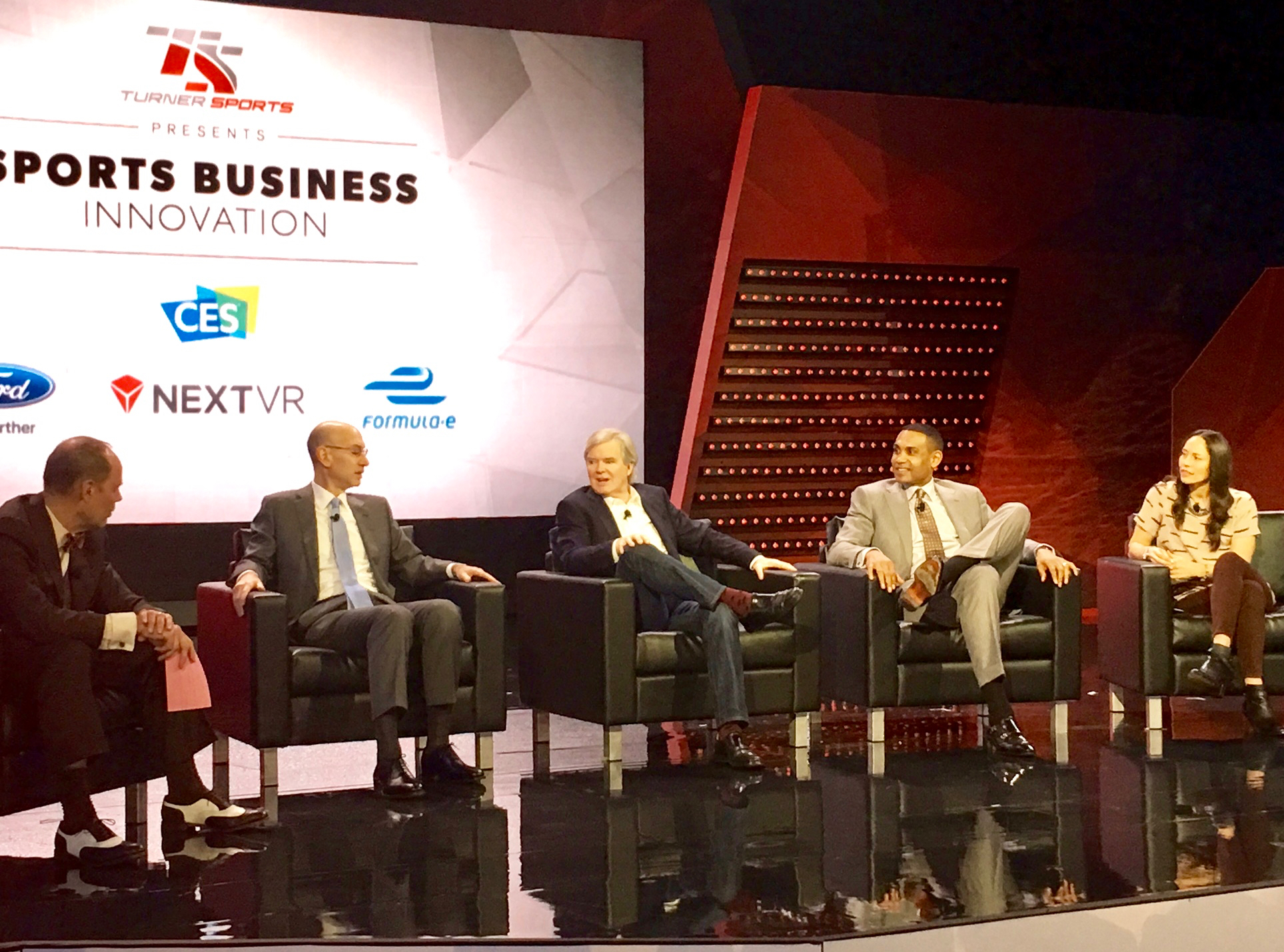Live From CES 2017: Turner Sports Business Innovation Summit Panel Focuses on Social Media
Story Highlights
The CES Sports Business Innovation Summit, presented by Turner Sports, kicked off with a discussion about social media and how players, leagues, and sports organizations can make the most of quickly evolving platforms that can be addictive, engrossing, and more.

TNT’s Ernie Johnson (far left) moderated a panel that discussed social media and more at CES. It featured (from left) Adam Silver of the NBA, Dr. Mark Emmert of the NCAA, Grant Hill of TNT/NBA TV, and Sue Bird of the Seattle Storm.
Grant Hill, NBA analyst, TNT/NBA TV, and former NBA player, said that social media is a great way to connect with fans and people he admires and may not know. But a downside he sees is the temptation to be consumed with being a voyeur of other people’s lives and that it also taps into the narcissistic side of being an athlete.
“Years ago, in the locker room, players would talk to one another during halftime or have a conversation after the game,” he said. “But now everyone is on their own device. So I see a little bit of player interaction being lost because of social media.”
The upside, he said, is that players can more easily have a voice concerning social causes, something he said he didn’t have as a player in the 1990s when journalists ultimately controlled how the public perceived an athlete. NBA Commissioner Adam Silver noted that the NBA encourages its players to use social media to talk about the issues that are important to them.
“Social media is a part of that process, and we help them understand the guardrails. We are protective of them and the business as they are representative of the league when they use social media,” he said. “Social media demonstrates how multidimensional the players are, and, for a league like the WNBA, it also shows how multicultural it is as 25% of the players are born outside of the U.S. So there is a fascinating global community with people commenting from around the world.”
Veteran WNBA player Sue Bird, point guard for the Seattle Storm, said she learned the negative power of social media years ago when Twitter was new and a player was fined for tweeting negatively about having to take part in a season-ticket–holder event.
She also sees a difference between how she approaches social media and how younger players or college players do. For example, she looks at social media and ignores negative tweets or posts. Others tend to engage, a move she says ultimately gives the negative commentator what they want: their moment.
“I love that you can be connected and show another part of your personality, but you see young kids getting judged all the time even when the behavior they are doing might be normal for a college student,” she eplained. “There is a higher level of responsibility now than there was 15 years ago.”
Dr. Mark Emmert, president of the NCAA, echoed her sentiments, adding that 18-year-old college athletes can quickly learn a life lesson when doing things like posting political views.
“We work with them closely to understand their level of responsibility because, once you say something, you can’t bring it back in and you can have a tsunami of reaction,” he explained. “And, [with] an 18-year-old, there is a different dynamic in handling that.”
Silver added that social media not only allows the NBA to get messaging out but also to gather market intelligence.
“It’s a tool where you can learn a lot about your business,” he said. “If there is an issue with NBA League Pass, I will learn about it faster on social media than through our own organization. And we can see how we are trending on Twitter, what fans think of the rules or the format of the game or even the CBA. We have an incredible group of engaged people who are passionate about this game, and they want to communicate.”
Social media is also playing a key role in spreading the popularity of sports beyond borders. Emmert said that college sports continues to show gains overseas and that often, when he meets people overseas and discusses the NCAA, they don’t know what he is talking about. But, when March Madness comes up, they quickly understand what he is talking about, thanks to the streaming of March Madness games and social media.
With Turner Sports and CBS Sports holding the March Madness rights through 2032, Emmert said he has had a chance to learn about how future technologies might impact how March Madness will be consumed during the next 15 years.
Silver took a stab at what the NBA viewing experience might be like in five years. One key development he sees is that authentication will become easier and get to the point where someone might see a Tweet regarding a game, then click on a link, and instantly be brought to that game.
“And,” he added, “you might be able to watch the last five minutes and pay a price just to watch those five minutes versus watching the game for two hours.”
Hill added that VR is one of the mediums that he thinks will grow in popularity. And, of course, as millennials get older and more numerous, digital platforms will continue to gain in importance.
“Their language and their currency is digital, so how we engage with fans there is important,” he said. “We have the technology, so now we have to embrace that.”
